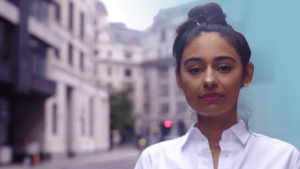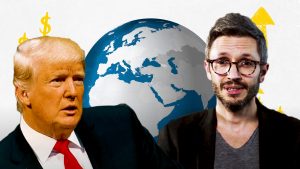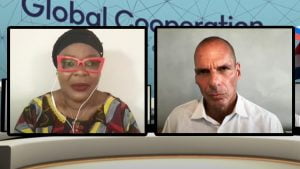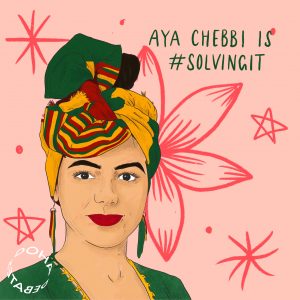
Global Cooperation
In the aftermath of the Second World War, the Allied powers laid the foundations for global institutions like the United Nations, the Universal Declaration of Human Rights, the World Bank and the International Monetary Fund (IMF). In light of the current coronavirus pandemic, we need global cooperation to rein in the virus and rebuild economies. Do our global institutions need to be reformed — or completely rebuilt? This is the driving question behind the debate and the lessons in this unit.
01. What We Know about Global Institutions
Are global institutions failing us?
What are the strengths and weaknesses of the institutions of global cooperation in today’s society?
In this activity, you will work toward a broader understanding of the multilateral institutions that promote global cooperation before watching the debate.
- Start by brainstorming everything you know about the United Nations, the World Bank and the IMF. Think about the historical context of their creation, purposes, member countries, successes, failures, etc. Use post-it notes to share the brainstorming process with peers and pool your knowledge.
- Now watch the short video to the left. What points did this add to your knowledge so far?
- What further questions does all of this raise for you?
- What are your personal views on the relevance of each of these institutions right now in the world?
02. Stakeholders in Global Cooperation
Here’s Why Foreign Aid Is a Scam
Who are the stakeholders involved in global cooperation on the world’s most pressing issues today – the pandemic, the climate crisis, inequality and injustice?
- Based on the information provided in the video to the left, brainstorm all the possible stakeholders in global inequality.
- Which stakeholders do you agree with?
- Which do you disagree with?
- Why do you think particular stakeholders take the positions they do?
- Try to assign a weight (1-5) to each stakeholder.
- Why it is important to look at international cooperation in terms of stakeholders?
03. Watching the Debate and Understanding the Issues
Global cooperation: New institutions for a new era?
What are the speakers’ positions on multilateral institutions and global cooperation, and is there common ground among them?
Listen to the speakers’ position statements early in the debate.
- Did any of the speakers call for the outright dismantling of the institutions being
debated? - What do you think sets the speakers apart from each other?
- What would you say is at the core of all three speakers’ positions?
- Imagine each speaker’s position as the tip of an iceberg, where the driving interests lie below the surface of the water. What interests underlie each position?
04. Multilateralism: Crisis of Representation
Global cooperation: New institutions for a new era?
How can we visualize these institutions, problems and social movements as a system?
Returning to your discussion about stakeholders in global inequality, now try to look at multilateralism as a system of connected parts (stakeholders) that impact each other and are impacted by political,
social, economic, cultural and climate factors.
- Who is impacted by the issue at hand?
- Who or what influences the issue at hand?
- Who is responsible for creating the issue? Who is responsible for fixing it?
- Who might support a solution for the issue? Who might obstruct a solution for
the issue? - Who has been involved in supporting this issue in the past?
- If each stakeholder were a dot, how big would their dot be? The more powerful they are, the more “weight” they have-
the bigger their dot.
05. Reflecting to Imagine Solutions
Global cooperation: New institutions for a new era?
How can we apply design thinking concepts to social problems like inequality?
Watch the speakers’ closing statements again (1:05:48-1:10:30). Which statement do you identify most strongly with?
- Leymah: “Young people need to focus less on celebrity culture and more on
the political life in their different nations, the local and national candidates
who best represent our collective humanity.” - Ece: “We need to refresh our faith in humankind, which has been corrupted
and lost over the past decade. Young people need to occupy the sunken ship.” - Yanis: “Protests come and go, fizzle out. Progressives need to form a common
action plan that includes new institutions in the solution.”
Now bring the speaker’s position that most resonates with you, your own creativity and what you have learned about this global
system together in a design thinking process aimed at seeking solutions.
- What is the problem? Start your design challenge with: How might we….?
- How do you want to impact the problem? Sticky-note brainstorm.
- Who do you most want to serve? Return to your stakeholder review for choices.
- What are 5 possible solutions? Free your imagination!
06. Taking Action on Global Cooperation
How can young people contribute to the social, political, and economic debates and movements around global cooperation in their communities?
Now put everything you’ve learned in this debate and the solutions you imagined to work and take action. Here are some ideas.
- Write a speech to present at the UN or a letter to the editor of a major newspaper.
- Design a public mural or performance art promoting your solution.
- Identify organizations already advocating in the direction you want to go and how to bring them together around your common message.
- Design an awareness campaign to pilot at your school or university.






